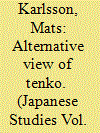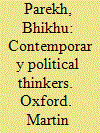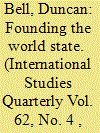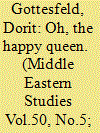| Srl | Item |
| 1 |
ID:
112850


|
|
|
|
|
| Publication |
2012.
|
| Summary/Abstract |
In discussions on tenko (political re-orientation) the case of Hayashi Fusao is invariably referred to as representative of the type of writer who never recanted his political conversion, not even after Japan's war defeat and return to democracy in 1945. Hayashi officially disavowed his Marxist convictions in 1936 and would for the rest of his life reiterate his rightist political leanings, culminating in his infamous In Affirmation of the Greater East Asia War. When considering Hayashi's tenko, critics usually rely on his various statements referring specifically to his re-orientation, coupled with an examination of his shift away from proletarian literature in serious works of fiction such as Youth (1934). In contrast, this article is an attempt to comment on Hayashi's purported conversion by focusing on samples of his rarely discussed popular writings that were published in the lowbrow youth literature magazine Shinseinen. This focus on Hayashi's predilection for adventurous storytelling aims to moderate the conventional image of him as a political thinker.
|
|
|
|
|
|
|
|
|
|
|
|
|
|
|
|
| 2 |
ID:
031999


|
|
|
|
|
| Publication |
Oxford, Martin Robertson and Co. Ltd, 1982.
|
| Description |
x, 219p.Hbk
|
| Standard Number |
0855203366
|
|
|
|
|
|
|
|
|
|
|
|
Copies: C:1/I:0,R:0,Q:0
Circulation
| Accession# | Call# | Current Location | Status | Policy | Location |
| 021109 | 923.2/PAR 021109 | Main | On Shelf | General | |
|
|
|
|
| 3 |
ID:
163284


|
|
|
|
|
| Summary/Abstract |
Herbert George Wells was one of the leading public intellectuals of the first half of the twentieth century. Most famous today as a founder of modern science fiction, he was once known throughout the world as a visionary social and political thinker. Questions of global order occupied a central place in his work. From the opening decade of the century until the close of the Second World War, he campaigned tirelessly for the creation of a world state, which would act as a guarantor of universal peace and justice. Yet, scholarship on Wells pays insufficient attention to the complex and conflicted nature of Wells's early views about how to build a world state. In particular, it neglects the tensions between his advocacy of a New Republic, formed by the unification of the English-speaking peoples, and his support for liberal imperialism. I analyze the development of this theme in Wells's political thinking during the years before WWI, a formative period in his intellectual life. I demonstrate how his conceptions of race, empire, and Anglo-American union shifted over time, show how his political arguments connected to his underlying views about social explanation and language, and highlight how his interpretation of the United States profoundly influenced his ideas about world order.
|
|
|
|
|
|
|
|
|
|
|
|
|
|
|
|
| 4 |
ID:
133527


|
|
|
|
|
| Publication |
2014.
|
| Summary/Abstract |
This article examines the writing of ?uz?mah ?ab?yib, a new generation Palestinian writer, who is considered one of the foremost Palestinian women writers. It focuses on her novel Qabl an tan?m al-malikah, which serves as an example of the bold and dissident writing of the new generation of Palestinian women writers. The article examines the way in which ?ab?yib creates a feminization of humour and a kind of a 'feminine humour'. ?ab?yib employs humour in order to shed light on the darkness of life and show how despite everything and in spite of an arduous and troubled life, women know how to enjoy the small and everyday things in life.
|
|
|
|
|
|
|
|
|
|
|
|
|
|
|
|